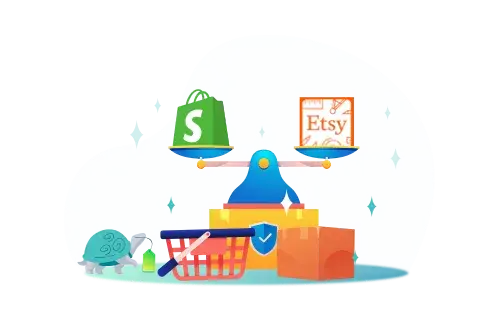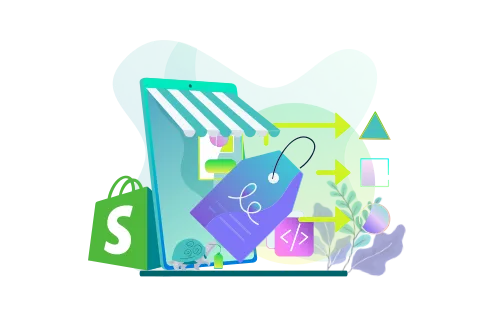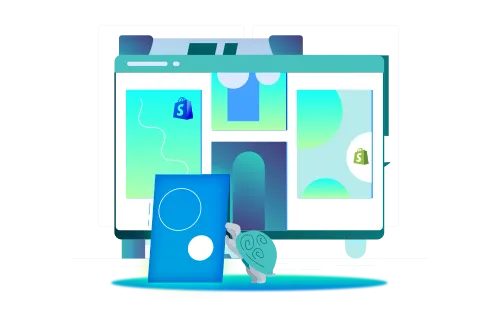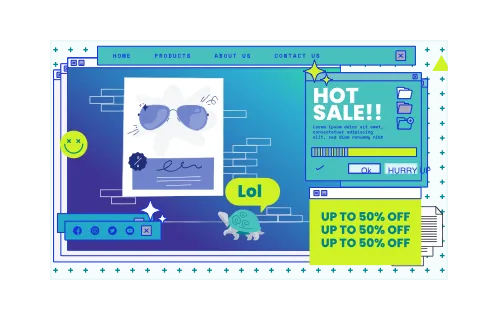Want to start selling B2B on Shopify? That’s a good idea, given the expanding B2B eCommerce market. Projected to surge from over $9 trillion in 2023 to above $33 trillion by 2030, it opens extensive business opportunities.
Unlocking a global marketplace, selling in bulk online, and generating large volumes of orders — all with remarkable efficiency — are just a few prospects you get from B2B eCommerce. Tap into this lucrative niche by leveraging our guide on Shopify B2B features and setup processes. GenovaWebArt, your reliable Shopify design and development vendor, will use its profound expertise to navigate you through this platform's capabilities.
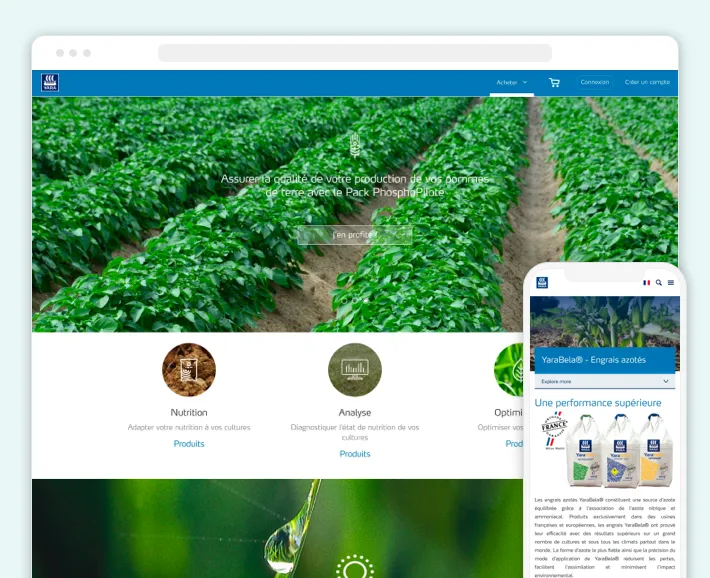
Table of Contents
- Key Benefits of B2B on Shopify
- Difference Between Shopify B2B vs. Shopify Plus Wholesale Channel
- Top Features of B2B on Shopify
-
Quick Tutorial on Setting Up a B2B Channel in Shopify
- Choose Shopify Plus Pricing Plan
- Create a Professional Store Design
- Install the Right Apps
- Create a Custom Pricing Strategy
- Streamline Ordering and Checkout
- Manage B2B Customers Efficiently
- Provide Excellent Customer Service
- Integrate with Business Systems
- Optimize for Search Engines
- Regularly Analyze and Improve
- Should You Move From Wholesale to B2B on Shopify?
- GenovaWebArt Experience in Shopify B2B
- Conclusion
- FAQ
Key Benefits of B2B on Shopify
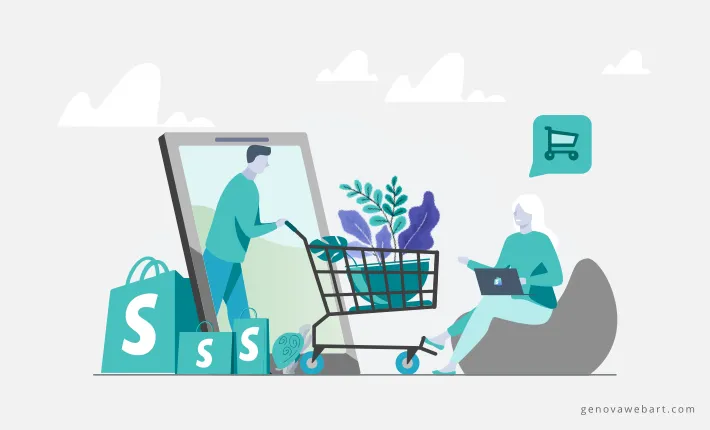
Shopify proves to be a robust platform for launching a B2B eCommerce website. Setting up your Shopify store here means getting the following advantages:
- Displaying discounts and wholesale prices. Shopify B2B businesses can establish transparent pricing effortlessly on shop, encouraging more bulk orders.
- Streamlined processes. B2B companies typically deal with high order volumes. Shopify makes all operations seamless, from automated inventory management and billing to order tracking and fulfillment.
- Higher average order value. B2B transactions on Shopify often result in higher values than traditional direct-to-consumer sales.
- Better customer service. Shopify B2B features like personalized pricing, custom catalogs, and dedicated customer support allow businesses to deliver outstanding customer care.
- Enhanced analytics and reporting. B2B companies can leverage Shopify’s extensive analytics capabilities to get insights into their sales trends, customer preferences, and more, leading to more informed business decisions. Additionally, integrating GA4 with Shopify enables deeper analysis and understanding of customer behavior, providing a more comprehensive view of the customer journey and ecommerce performance.
- Scalability and flexibility. B2B on Shopify provides significant abilities to expand your online store as your business grows.
Difference Between Shopify B2B vs. Shopify Plus Wholesale Channel
If you’re new to Shopify, here’s a brief recap. The Shopify Plus Wholesale channel served as Shopify’s earlier solution for B2B sales, but this eCommerce platform has introduced a better alternative — Shopify Plus B2B. This new option has several distinctions, which are as follows:
- Customizable features. Shopify B2B offers more customizable features than the Wholesale channel. Some include tailored pricing, customer-specific catalogs, tiered discounts, and configurable payment logic.
- Shop types. Shopify B2B, unlike Shopify Plus Wholesale, introduces two kinds of online stores: blended and dedicated. The first caters to businesses that sell to B2B and DTC customers within a single shop, while the latter is devoted exclusively to B2B clients.
- Increased efficiency. The newly introduced B2B features on Shopify enhance operational efficiency for businesses.
- Integration with business apps. Shopify B2B offers seamless integration with business applications and tools like CRMs, accounting platforms, and inventory management solutions.
Top Features of B2B on Shopify
When leveraging Shopify’s capabilities, businesses access a comprehensive set of tools that meet B2B eCommerce requirements. The following are the main features of B2B on Shopify:
- Password-protected shop. Shopify B2B allows businesses to build an online store protected by a password, enabling only authorized users to access it.
- Company profiles. Businesses can create a list of wholesale company profiles with their locations, payment terms, order history, and shipping options.
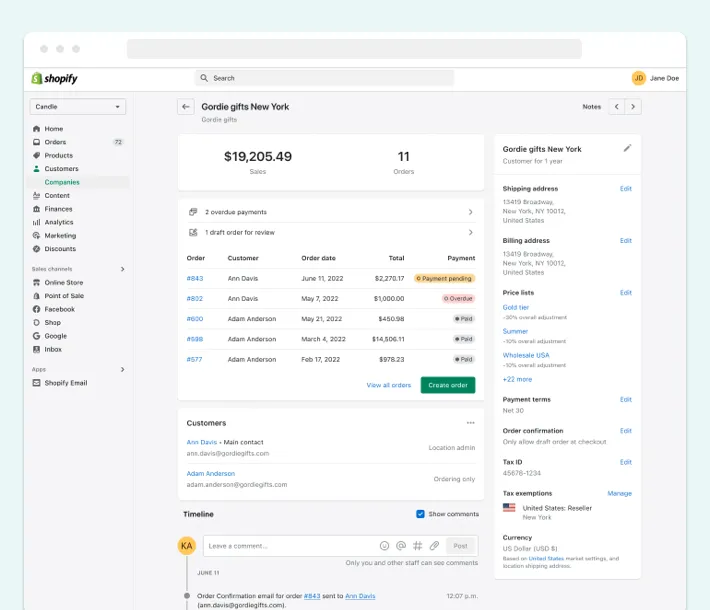
- Company metafields. This function lets companies gather and retain additional data about their customers of b2b on Shopify, such as company-specific details or location-specific requirements, making it easier to tailor their services.
- Checkout and self-serve purchasing. B2B customers can enjoy a streamlined checkout process handled from the admin panel. They also benefit from a self-serve purchasing feature that facilitates quick and hassle-free transactions.
- B2B customer management. Shopify enables businesses to manage B2B customer accounts by setting different user permissions.
- Customized price calculation. Businesses can customize pricing for their B2B customers based on order quantity, customer segment, or negotiated contracts.
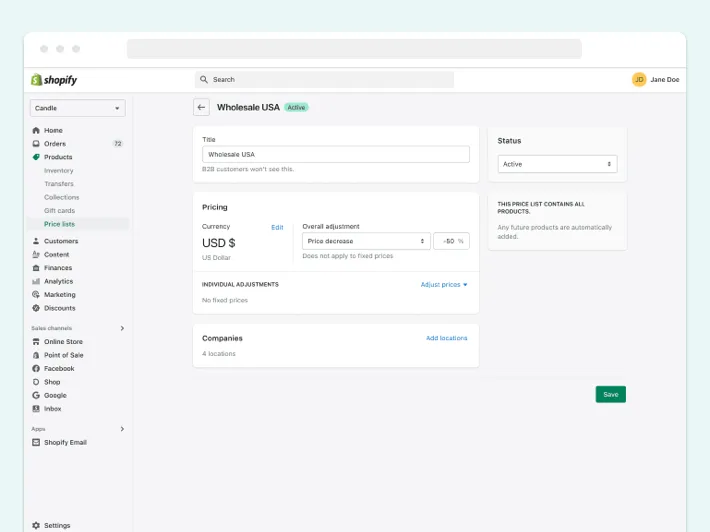
- Purchase-by-invoice. Shopify B2B facilitates purchase-by-invoice functionality, allowing B2B customers to place orders and receive invoices for payment later.
- Search engine visibility. B2B stores on Shopify benefit from SEO capabilities, improving their rankings in search engine results.
- Professional inventory management. Shopify’s B2B features provide users with inventory management tools for convenient inventory level tracking, accurate fulfillment, and proper stock allocation.
- Quantity rules. B2B businesses can establish conditional restrictions for products and their variants, such as minimums, maximums, and increments. These enable companies to define specific quantity requirements, ensuring accurate order placement.
- Integration into existing systems. Shopify B2B integrates with various business systems, such as CRM and ERP software.
- Global expansion. Selling wholesale on Shopify allows businesses to find customers worldwide with localized storefronts and currencies.
- Custom B2B solutions. Shopify allows businesses to leverage their B2B API suite and develop bespoke tools.
Quick Tutorial on Setting Up a B2B Channel in Shopify
As you can see, launching B2B for Shopify stores is a promising venture. But how to setup B2B on Shopify? Check out the following steps:
1. Choose Shopify Plus Pricing Plan
Currently, businesses can start their B2B portal on Shopify Plus. It’s a pricing plan providing significant customization and scalability options, and its best use cases include large-scale enterprises. The cost of Shopify Plus starts at $2,000 per month.
2. Create a Professional Store Design
Design a professional and user-friendly Shopify B2B store using intuitive interface and themes from Shopify Theme Store. Customize your storefront with brand elements, high-quality product images, and clear navigation to provide a seamless shopping experience for B2B customers.
3. Install the Right Apps
Enhance your Shopify B2B channel’s functionality by installing relevant apps from the Shopify App Store. Look for those that enable custom pricing, Shopify wholesale order forms, customer management, and integrations with business systems.
4. Create a Custom Pricing Strategy
Another matter to take care of involves developing tailored pricing for your B2B clients. You may want to use Shopify’s built-in features or specialized apps to implement customer-specific pricing and discounts.
5. Streamline Ordering and Checkout
Simplify the ordering process for B2B customers by customizing order forms and implementing self-serve checkout options. Make it easy for your clients to navigate through product catalogs, select quantities, and complete purchases.
6. Manage B2B Customers Efficiently
Once you prepare the foundation of your online store, start managing your B2B clients: assign tailored pricing and user permissions. You can do this through comprehensive customer management tools offered by Shopify.
7. Provide Excellent Customer Service
Deliver exceptional customer service by promptly addressing questions, providing support channels, and ensuring accurate Shopify order fulfillment. Implement communication channels like live chat or dedicated customer support to offer a superior B2B experience.
8. Integrate with Business Systems
Integrate your Shopify B2B channel with existing business systems such as CRM, ERP, or inventory management tools. It will ensure smooth data synchronization, streamlined workflows, and efficient operations.
9. Optimize for Search Engines
Leverage SEO strategies to increase visibility in search engine results. Optimize product descriptions, use relevant keywords, and generate valuable content to attract organic B2B traffic.
10. Regularly Analyze and Improve
Use Shopify’s analytics tools or third-party apps to gain insights into your B2B sales performance. Monitor key metrics, customer behavior, and find ways to enhance your store.
Should You Move From Wholesale to B2B on Shopify?
Another dilemma businesses may encounter is whether migration from wholesale to B2B on Shopify is worth it. And we’ll say yes. It can actually become a turning point for your business. Here’s why:
- Tap into a growing market. As the B2B eCommerce industry expands, businesses can leverage these growth opportunities. By migrating to a B2B model on Shopify, you access this thriving market.
- Reach a global marketplace. You can expand your reach beyond geographical limitations and connect with potential customers worldwide, increasing your business’s visibility and revenue potential.
- Get efficient and scalable operations. B2B eCommerce on Shopify simplifies complex workflows, making them more efficient and scalable while saving you time and resources.
- Personalize customer experience. B2B customers expect a customized experience, and Shopify’s B2B features allow you to meet their needs.
GenovaWebArt Experience in Shopify B2B
GenovaWebArt brings a wealth of experience and expertise to the world of Shopify. We have proven ourselves as trusted partners for businesses seeking success in the eCommerce landscape, B2B included.
One area of expertise that differentiates us is migrating clients from Shopify Wholesale to Shopify B2B. Recognizing the evolving needs of businesses, the GenovaWebArt team assists them in seamlessly transitioning from the older platform to access advanced B2B capabilities. We also have extensive experience in OpenCart to Shopify migration, and can help businesses of all sizes make the switch to Shopify B2B.
Besides that, we offer numerous other Shopify-related services. Our core offerings include the following:
- Shopify theme development and customization
- Shopify app development
- Shopify design
- Shopify Plus development
- eCommerce migration to Shopify
- Shopify expansion and scaling
- API and third-party apps integration
To understand our capabilities and successful projects better, we invite you to explore our portfolio and case studies like Kit & Kin. Discover how GenovaWebArt has helped businesses achieve their eCommerce goals and unlock their full potential on the Shopify platform.
Conclusion
Embarking on a B2B journey with the Shopify platform opens up new ways of success for your business. Given the rapidly expanding B2B market and its benefits like global reach, streamlined operations, and personalized experiences are too critical to ignore. Don’t miss that opportunity, and start leveraging Shopify B2B features today.
To ensure a smooth and successful online store launch, seeking expert guidance from a team like GenovaWebArt is highly recommended. With our specialized knowledge and experience in B2B eCommerce, wholesale, and Shopify, we can provide valuable insights, strategic consultation, and tailored solutions to maximize the potential of your B2B channel on Shopify.
Got interested? Contact our team to realize your business’s full potential in the B2B market.
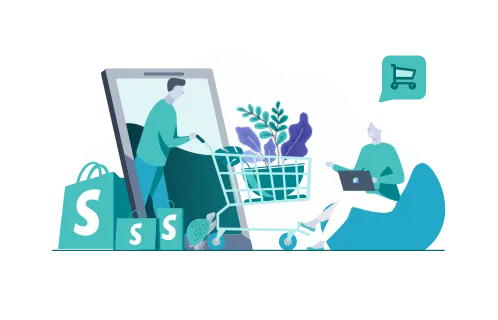
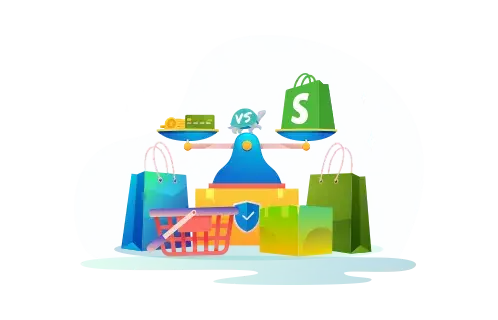
![Shopify ERP Integration: Pros & Flow [2024] - GenovaWebArt blog article, banner image Shopify ERP Integration: Pros & Flow [2024] - GenovaWebArt blog article, banner image](https://genovawebart.com/hubfs/img/webp/hero-banner-blog-article-shopify-erp-integration.webp)
